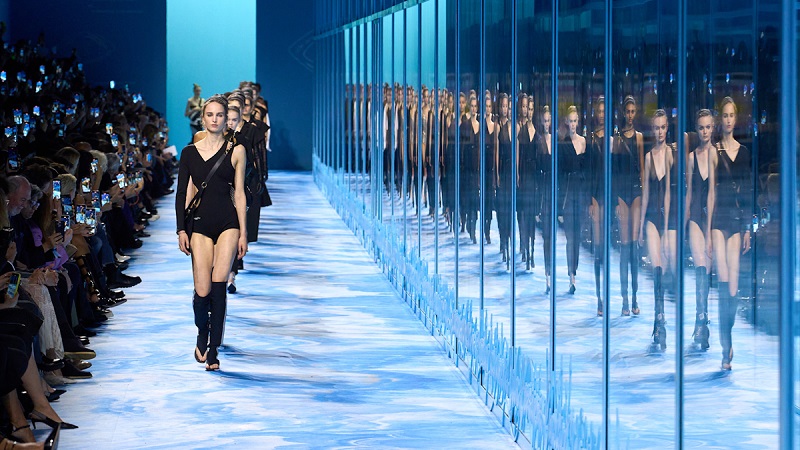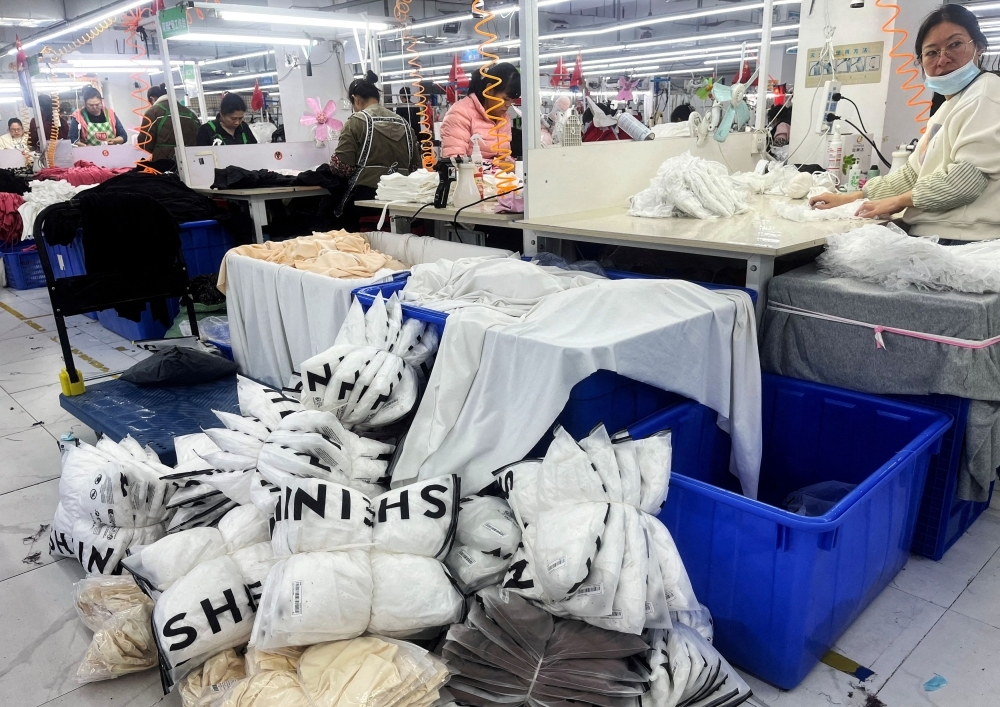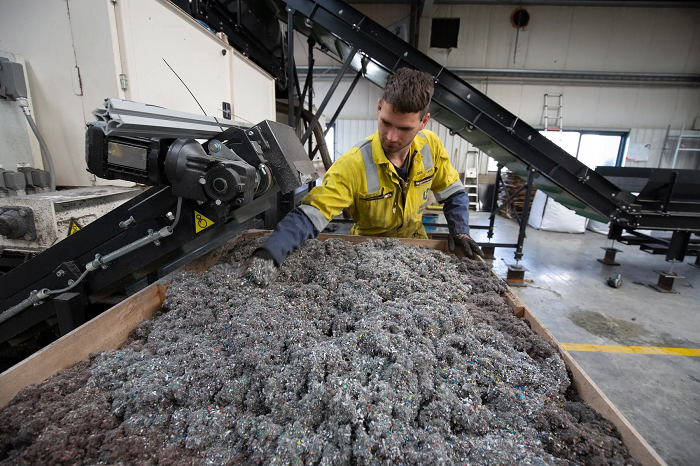FW
PVH has been doing extremely well, mainly because of its brands Calvin Klein and Tommy Hilfiger, in particular.These two brands are performing impressively worldwide and significantly contributing to the company’s profitability.
For fiscal 2018, revenues are anticipated to increase roughly nine per cent at Calvin Klein and eight per cent at Tommy Hilfiger. For the fiscal first quarter, the company expects revenues to grow 17 per cent at Calvin Klein and 19 per cent at Tommy Hilfiger.
PVH also has a significant international presence and outlets in various tourist destinations in the United States. Impressively, currency has been favorably impacting the company's results. Given sturdy fourth-quarter fiscal 2017 and currency tailwinds, management issued bullish guidance for first-quarter and fiscal 2018. It expects favorable currency to boost adjusted earnings by 20 cents per share in the first quarter and nearly 35 cents per share in fiscal 2018.
Additionally, PVH boasts a healthy balance sheet, which provides it the financial flexibility to drive future growth. In fact, the company’s ability to generate a strong operating cash flow has helped in the execution of its long-term strategies, such as global expansion, product enhancement and brand offerings, and building of operational infrastructure.
Sportscraft has produced a winter campaign centered around Australian Merino wool and the origins of the natural fiber.
Sportscraft is Australia’s longest-serving Woolmark licensee and is an iconic Australian fashion brand.
The winter campaign plays to the raw, textural qualities of wool and its connection to the Australian landscape, exploring the idea that wool is woven into the fabric of the land. It illustrates the life-cycle of wool. The campaign speaks to the craftsmanship and quality of the product with a video illustrating the journey of wool - from humble beginnings to premium apparel that will be distributed across Sportscraft’s online and social channels.
The video cinematically represents the design process behind the creation of the Woolmark product for the season.
A mixture of men’s wear and women’s wear pieces make up this year’s winter collection of the brand, with more than 150,000 items of wool and wool-rich clothing. Key Woolmark items include a selection of women’s wear jumpers in classic V-neck, turtleneck and cable knit styles, long-sleeve tops, three coats and a waterfall cardigan. Men’s wear includes a variety of jumpers, long-sleeve tops, vests, a cardigan and a knitted zip-up hoodie.
Sportscrafthas 246 stores and concessions across Australia and New Zealand.
India’s annual retail inflation accelerated in April to 4.58 per cent.This was mainly driven by faster increases in food and fuel prices.
Core inflation, mainly reflecting firming up manufacturing prices, touched 5.9 per cent, a 44-month high.
Wholesale price inflation in April rose faster than expected, to 3.18 per cent. Annual retail food inflation, which contributes about half of the weight in the CPI index, rose 2.80 per cent in April almost at the same level of 2.81 per cent rise in the previous month.
It’s possible retail inflation could cross the five per cent mark in the next two to three months. As the economy gathers momentum, capacity utilisation could tighten further, which will boost underlying price pressures.
The biggest risk that Asia’s third-largest economy faces is rising crude oil prices, which are at their highest since November 2014 following prospects of new US sanctions on Iran.
India meets 80 per cent of its oil needs from imports. An increase in the oil price could quicken inflation by about one percentage point and reduce economic growth by 0.2 to 0.3 percentage points.
However India’s economic growth could rebound to 7.4 per cent in fiscal year 2018-19 beginning April, from an estimated 6.6 per cent in the previous fiscal year.
The International Labor Organisation (ILO) and Istanbul Apparel Exporters’ Association (IHKIB) are working together under a cooperation protocol.
The protocol would contribute to the creation of decent work for Syrians and host communities in the apparel industry as a leading industry of current and potential employment and support an enabling environment for economic growth.
The ILO office for Turkey has undertaken activities since 2015 for the Syrian refugee crisis.
The joint program by IHKIB and ILO will be implemented in provinces where Syrian refugees live in large numbers. The focus in this collaboration program will be on member companies which employ and intend to employ Syrians. The program will coordinate the operations of such companies in production, social compliance, and human resources management. It will include Turkish workers as well as Syrian guests in the sectoral labor force to further strengthen the sector.
The protocol will be valid for two years. It’s expected to set an example for subsequent schemes of cooperation.
As a most important sectoralorganisation with more than 7,000 members representing the Turkish apparel industry, IHKIB makes significant contributions to the sector and the Turkish economy.
Turkey’s apparel exports to the EU are 75 per cent of total Turkish apparel exports.
Pakistan’s progress in gaining advantage of the GSP Plus status has not been impressive.
The increase in exports to the EU during the first half of 2014 was about 12 per cent. There has not been much increase after that. In 2012-13 the growth was 12 per cent per annum. Exports during the year 2013-14 increased by 28 per cent. Exports in 2014-15 decreased by 1.3 per cent, then marginally increased by 1.1 per cent in 2015-16.
During the years 2008-17, exports to the EU increased at a rate of about seven to eight per cent a year. With the inclusion of Pakistan in the GSP Plus, it was expected that Pakistan’s exports to the EU would increase by 20 per cent or more during the next few years.
Pakistan’s exports to the EU are generally concentrated in six countries, the UK, Germany, Spain, Italy, Netherlands and Belgium. They have accounted for around 80 per cent of the total trade to the EU for the last ten years.
This shows that Pakistan was unable to diversify its exports to other countries. The product mix of exports has also remained the same. Textile and textile products are the major export products and account for around 65 per cent of total exports, followed by food and beverages.
Gap has apologised for selling a T-shirt which had an image of an incomplete map of China.The T-shirt doesn’t feature territories which are claimed as Chinese, including south Tibet, the island of Taiwan and the South China Sea.
The products have been pulled from the Chinese market and destroyed. , Gap added it would implement rigorous reviews to prevent a repeat mistake and that it respects the sovereignty and territorial integrity of China.
Gap's apology comes as China has been ramping up efforts to police language used to describe Chinese-claimed territories such as Taiwan.
China claims a number of contested territories, but is particularly sensitive about Taiwan, a self-ruled island that it considers to be a province of China that will eventually be fully reunified.
Earlier hotel chain Marriott was forced to shut down the Chinese version of its website for a week and fast-fashion retailer Zara was ordered to complete a self-inspection and turn in a rectification report when the companies' websites listed certain areas, including Taiwan, as countries.
China also wrote to 36 foreign airlines demanding they stop referring to Taiwan, Hong Kong, and Macau as countries.
Earlier this month, the White House sharply criticized China's efforts to force foreign airlines to change how they described Taiwan.
Fosun has acquired a majority stake in Wolford.Fosun is a Chinese company, which invests in the global fashion and consumer goods industry. Wolford, based in Austria, makes tights, bodysuits, and innerwear.
Fosun Fashion Group holds stakes in the German Tom Tailor Group and the French luxury brand Lanvin, among other holdings.
The capital increase guaranteed by Fosun will sustainably strengthen the equity base of Wolford. With the help of this financial strong majority shareholder, Wolford will be able to accelerate the expansion of its promising online business and redesign its market presence, thus returning the company to a growth path.
As China continues to drive the global luxury market, Wolford can leverage Fosun’s expansive China and global resources to grow and strengthen its high luxury positioning while maintaining its exceptional high quality of production in Europe.
Wolford has 16 subsidiaries and markets its products in approximately 60 countries through over 270 own and partner-operated retail stores, 3,000 trading partners, and online.
Chinese firms are buying famous brands in the hope of upgrading their image. Buying famous foreign brands is seen as helping them build up their own brands, and proper management and deployment of sales channels may help them gain more popularity with domestic consumers.
Chinese e-commerce players are also moving quickly into western markets.
Faire Child, based in Canada, makes recyclable clothing.This includes children’s raincoats, splash pants, coveralls, caps and backpacks.
These are made of a recyclable German fabric derived from plastic bottles. This chemical-free fabric, constructed out of three layers, is extremely light and very soft to the touch. It’s the only fabric fully recyclable. It’s breathable, waterproof, washable and dirt resistant.
The target market is affluent parents 25 to 45 living in urban centers and interested in sustainable fashion. They want their children to get away from the screen and outdoors to learn to love and care about nature.
To make one coat requires 19 plastic bottles. The durable weatherwear with heat-sealed seams can be worn year-round with layers, and the coveralls are a great alternative to the traditional, puffy, limb-immobilizing snowsuits.
The clothes are shipped to online buyers in compostable packaging with labels made from sugar cane.
Through Faire Child’s Take Back Program, purchasers mail in their garments for recycling right down to the brass snaps and receive a 15-per cent discount on the next purchase.
The fashion industry produces waste that ends up in the landfills of developing countries. Millennials committed to sustainable living are willing to pay a price for a product that reduces waste and doesn’t become waste.
Painstakingly slow steps have been taken to end the widespread prevalence of sweatshops.
Millions of workers around the world continue to contend with a globalised system that thrives on inhumane working conditions.
Often progress comes in the form of a reactive action that follows an incident in which large numbers of preventable fatalities have occurred.
In particular, the Asia-Pacific region has for too long been seen as the developed world’s manufacturing room for clothing and footwear. With little to no labor protection enforcement and regulation in many of Asia’s developing countries, this part of the world has proven to be an opportune area for multinational corporations to increase profit margins via worker exploitation.
It’s estimated there are some 75 million people employed in the apparel sector around the world, and three quarters of them are women and young girls.
The International LabourOrganisation has been working in the Asia-Pacific region to improve conditions in the readymade garment sector, including in Bangladesh. The EU-Vietnam Free Trade Agreement has also been put on hold due to demands that trade accords not be signed with countries that do not uphold human and labor rights.
As countries in the Asia-Pacific continue to develop at accelerated rates, the cycle of worker exploitation has continued.
Arvind will use Directa Plus’ graphene-based products in denim fabrics.
The products can be used in a variety of ways to alter or enhance the properties of conventional denim fabrics, and to produce smart clothing for different purposes and environments. End-users will benefit from the thermal and electrical conductivity and bacteriostatic properties, such as thermal regulation, heat dissipation, energy harvesting, data transmission and no odor effect.
Directa Plus is a supplier of graphene-based products for use in consumer and industrial markets. Arvind is India’s leading textile-to-retail-and-brands conglomerate. Each year Arvind Denim produces over 100 million meters of fabrics and six million pairs of jeans.
The use of graphene in denims is new and is expected to yield some of the smartest, most widely used fabrics in the years ahead. Graphene is a nanomaterial that, when processed and blended with other materials, significantly enhances their performance.
Directa Plus’ graphene-based products give remarkable properties or added functionality to a variety of consumer and industrial products. The company utilises a unique and patented technique called Plasma Super Expansion. Its production process is scalable, portable, chemical-free and results in almost zero waste.
Directa Plus was established in 2005 in Italy to develop innovative nanomaterial production processes. The company has developed its own exfoliation process that can be used to produce super-expanded graphite and fine nanographite powder.












